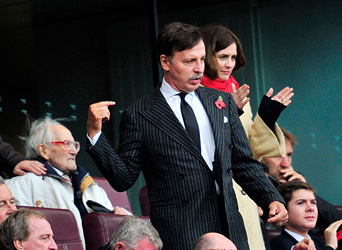So Stan Kroenke has extended Arsène Wenger's contract, overruling half the club's board and three quarters of its fans. Legally, it's his right to do that because he owns more than half the shares. He can hire and fire as he wants because the law says the club is his property, just like any other company. A supermarket, a car manufacturer, a football club: in English law they are all the same. The majority shareholder rules the roost.
But is that really how things should be? At their roots, football clubs grew out of working class communities, funded by turnstile receipts and the generosity of successful businessmen in those communities. They were run by fans, generally well-off fans, people whose focus was sporting success. Nobody saw them as an investment class and nobody expected to make any money out of owning them. Famously, when in 1983 David Dein invested £292,000 for 16.6 per cent of Arsenal, Peter Hill-Wood described him as "crazy", saying that "to all intents and purposes it's dead money".
Fast forward 30 years and, one by one, the most successful clubs have been bought up, the original fan-owners being replaced by remote billionaires with no connection to the communities the clubs are rooted in and often with precious little understanding of the game of football. This new breed of owner is not all bad; there are some noticeably generous billionaires who have helped their new acquisitions to greater glory than they could possibly have achieved otherwise. Chelsea and Manchester City are obvious beneficiaries. But other clubs have fared less well, Arsenal included. The point is that a club owned by a billionaire is completely at the mercy of that individual. From a fan's perspective it's luck of the draw whether they are good owners focused on sporting achievement, or bad owners marking time till the next TV deal increases the value of their investment.
It doesn't have to be that way. According to KPMG, the second, third and fourth most valuable clubs in the world are Real Madrid, Barcelona and Bayern Munich. Unlike the English clubs sandwiching them in the football rich list, none of them is owned by a billionaire. All three are owned by their fans, who elect a president to run their clubs day-to-day. Unsurprisingly, the presidents give their electorates what they want, success on the pitch and low ticket prices. Former Barcelona president Sandro Rosell summed it up well: "Barcelona is not a business, it is a feeling." Can you imagine Silent Stan saying that about Arsenal?
However appealing fan ownership would be in England, there is one big practical issue to overcome: the cost. The existing owners would need to be compensated, and the value of the clubs is so high the fans would struggle to come up with the cash. According to the KPMG report, Arsenal is worth around £1.8 billion. Let's say all 45,000 season ticket holders got together to mount a takeover bid. Each of us would have to find £40,000 to chuck into the kitty. I'll look down the back of the sofa later.
So is there another approach? For most of us, loyalty to our football club is a lifelong emotional investment. It's not a commercial decision, like choosing a supermarket. Nobody has ever taken his kid to Morrisons and said "I was there when this shop won 1974 Supermarket of the Year (Northern)." Nobody has ever got a "Tesco till I die" tattoo. Nobody has ever been heard chanting "Sainsbury's, Sainsbury's, Sainsbury's" on their way home from a particularly thrilling shopping trip. Football is not a business and it does not exist to enrich its shareholders. There is a case for the law to recognise that there is more to football than the property rights of owners. There is already a precedent for this in the right of flat owners to get together and take over the management of their blocks. Our homes are our castles and our football clubs are our tribes. To borrow a phrase, let's take back control of our clubs.
Here is my proposal: let's lobby our MPs to give us a fans' right to manage. Stan and his ilk would still own the club, and they would get the increase in the value of their investments that the increasingly lavish TV deals bring. But we would have the right to appoint the board. We are blessed with lots of well-qualified fans. On the last day of the season against Everton I was two rows back from Mark Carney, the governor of the Bank of England, and going home on the Victoria Line I saw the speaker of the House of Commons, John Bercow, wearing his Arsenal shirt. The talent to do the job is there, we just need to press our elected representatives for a change that would be very popular. The politicians will be desperate to line up with us!
What do you think?








